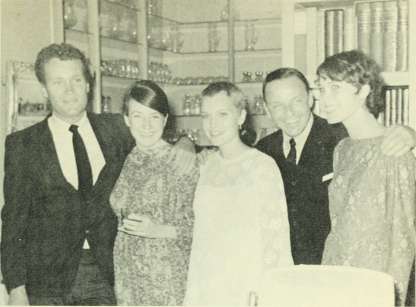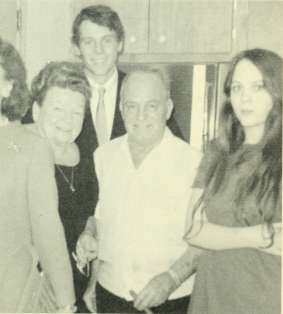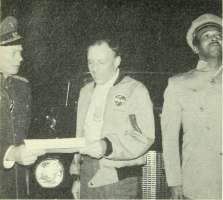What falls away : a memoir (27 page)
Read What falls away : a memoir Online
Authors: 1945- Mia Farrow
Tags: #Farrow, Mia, 1945-, #Motion picture actors and actresses

G hapter VI in e
In the summer of 1985, newborn baby Dylan came home. It was no accident that she was a little blond girl—the kind of child, he said, he would be most inclined to view positively; although, he was careful to add, it was certainly no guarantee. Soon-Yi and I traveled to a state in the Midwest, and together we brought baby Dylan home to Frog Hollow.
Since Moses was already two years old when he arrived, there had not been an infant in our family tor eleven years. Eight wondrous faces crowded around the wicker basket, we watched her in her dreams, and we watched her study the birch leaves moving against the summer sky. Moses and Fletcher, proud and careful, pulled her about the garden m their red wagon, padded now with the patchwork quilt I'd made for the twins, sixteen years earlier. I named her after Dylan Thomas, and Casey became her godmother.
In the fall, when Woody and I went on our walks and discussed the upcoming WAFP, Radio
Dcr)iSj baby Dylan nestled snugly in the pouch on my chest, so quiet and small he barely noticed her. In preparation for my role of Sally the cigarette girl, I took daily singing lessons with my new daughter in my arms. My teacher even remarked on her perfect pitch.
By the time we began Radio Days that winter at Astoria Studios, Dylan was a serene and purposeful little girl with the beginnings of blond curls and a surprisingly raucous laugh. Even Woody was beginning to find her irresistible. It seemed to be the miracle I had hoped for. We shared our delight in the baby, and even discussed adopting a sister for her the following year.
"It might make sense to find a place big enough for all of us," he said to me one day. "I could have my own floor or wing away from everybody, so I can work. The kids would love living in a house. It could be like in Meet Me in St. Louis."
I proposed sharing my apartment, which was larger than his. But it wasn't nearly big enough, he said, and it wasn't on the East Side. I pointed out that if we got a place on the West Side, it would cost much less, and over the years I'd be able to pay him back for my half. I told him I'd feel better if I could do that, because if for some reason our living together didn't work out, I didn't want to have to pack up my eight children and move out. I didn't want to do that again, and I didn't want the kids to have to go through it either, because wherever we lived should be their home. So, if we ever decided to go back to living separately, I would do my best to pay him for the whole house. But places on the East Side, in the neighborhood he was talking about, cost many millions of dollars.
"Keep your apartment as a backup," he said. I could see he was losing interest.
"But that's just it: I wouldn't be able to keep it, it's 'rent stabilized,' " I heard myself yammering, a little too brightly. "If we're not living in it, if it's not our primary residence.
the landlords can up the rent as high as they want. Our apartment's been in the family for twenty-somethmg years, it's a big deal to lose it. I'd never find another place big enough for all of us that's this affordable."
"Well, you'll have to work that out," said Woody. Which I never managed to do.
We had another talk about marriage, our second; eight or nine sentences was all, repeating what had been said before. Then I brought up the thing that worried me most: the thing that happened in front of the house that wasn't William Buckley's; and another time, when I didn't know the name of a certain kind of pasta; and again, when I was off in my estimate of the weather by only four degrees; and when I asked about a dream he'd had the previous night, when he had mumbled the words "Dolly Parton." Each of these times he had become so enraged, and his attacks were devastating. He always apologized afterward, but still, I was afraid it might happen again. If we were living together, it might happen more frequently, and maybe even worse. What if it got worse? And how can you avoid making someone angry when you don't have any idea what happened or why? And most important, what if he ever turned that anger on one of the kids?
He promised me it would never happen again. Ever. And I could tell he meant it this time. So we began, cautiously, to look at big houses and double penthouse apartments on the East Side. We found the house of our dreams on Seventy-third Street: every room was fiUed with sunlight, and it had been built on two lots, so the garden was extra large—the kids would be able to go outside whenever they felt like it. They could make snowmen, we could plant flowers and vegetables, strawberries, and jasmine. What a different New York life it would be! Moses would collect bugs after school; he and Matthew would play chess under the apple tree; we would build a tree house; Lark would do her cartwheels on the grass; baby Dylan would have her
very own swings and sandbox right here in Manhattan. I pictured the kids and their friends playing badminton, reading in the hammock, shooting basketball. Soon-Yi would find more four-leaf clovers, and my mom would come to visit. We'd all have lunch outside and then she'd play old songs on the grand piano while I made tea. Woody would have his private space for work, and his special bathroom, and a poolroom and a Ping-Pong table. We will be the Meet Me in St. Louis family. We will watch the children grow. From our places by the fire we'll talk and laugh and wonder and love until we are worn-out.
Woody put in a bid to buy the house. Then, while we were dreaming, the owner changed his mind. We went on looking and working and living our lives in all the same ways with one small but growing difference, baby Dylan.
Winter had set in when we began Radio Days in late 1985. Mv feet were blocks of ice, while in snappy, forties high heels I pamfully clomped the streets near Shubert Alley. Winds below zero froze my nylon stockings and silk dresses. With bright red lips and chattering teeth, I kissed a soldier in Grand Central Station. But mostly we were in Queens, at Astoria Studios. Fletcher, then eleven, was given a role that required him to be at work more than me, but on different days. Woody offered to bring him to and from the studio and assured me he would look after him there.
I loved playing Sally, the airheaded cigarette girl, and it suited me fine that it wasn't a long part. I brought Dylan with me to work, but I preferred being at home with her. Times were good. When occasionally a small cloud covered the sun, the powerful winds of our good fortune blew it quickly past; but it was strange, for that moment, how dark the clouds seemed in a perfect, clear sky.
Fletcher was pale and quiet when Woody brought him home one evening. His ear ached, he said. He couldn't get
warm and he was beyond hunger. They had been shooting outside all day on a rooftop. The forties-period costume Fletcher had to wear was scarcely effective against the wind and cold, and the scene had taken almost all day to shoot. Instead of breaking for lunch, cups of hot soup had been handed out to the crew, but nobody gave anythmg to Fletcher.
It was the first time in our five and a half years together that I confronted Woody in real anger. It was unthinkable to me that he could have been there m his Eddie Bauer arctic gear, drinkmg hot soup, without any thought or feeling or sense of responsibility for Fletcher.
Not two weeks later we had a similar conversation when he brought Fletcher home deeply upset after shooting. Woody had taken him to see dailies, a scene in which, as SaUy the cigarette girl, I came on to this guy, and he was all over me. There were two or three complicated shots, so a number of takes were printed, and it took a long time to view them all—an eternity, apparently, to my eleven-year-old son. And I knew just how he felt, having, as a child, watched my own mother in the arms of Joseph Gotten.
Some days after that, with a face full of worry, Fletcher told me about an actress at work who was being affectionate in the extreme with Woody, which, come to think of it, had not escaped my attention when we were making Hannah. There was just a moment—a greeting she might have done differently if she'd seen me in the doorway. Except, of course, it was out of the question: she was so nice and he loved me more than ever, and he was top-drawer in every significant way, so I certainly didn't need to worry about her hanging around the editing room. It was understandable: she was trymg to learn the trade, he said, so she could direct a movie herself someday. Besides, I do not rush to judgment. I block it out.
Still, Fletcher was hoping Woody would come to his sixth-grade graduation that June, and Woody had told him
he'd see if he could make it. But as the weeks passed with no further word, Fletcher prodded me to ask him.
"I don't want you to feel pressured," I said, as we were crossing West Seventy-second Street, "but it would mean a lot to Fletcher if you would come to his graduation."
"I'll have to think about whether you have any right to ask me that," he said, cold as ice. Better he had slammed a fist in my face. Then he was talking nonstop like always about the next movie, so he didn't notice how, right there on Seventy-second Street, a part of the dream began to die.
Of course I didn't bring it up again. Fie didn't come to the graduation. And he didn't seem to notice as Fletcher quietly withdrew.
In the summer of 1986 Casey and I took our kids in my big red Suburban to visit my mother and stepfather in upstate New York, then on to a grand adventure exploring the Howe Caverns, while Woody m New York was busy writing the next WAFP, September.
Initially he planned to make the film at Frog HoUow; ever since he first saw the place he'd been saying how perfect it would be to shoot a movie there, the way the rooms flowed into one another, the relationship of the house to the lake and the guest cabin, the woods, and the field, his favorite place to walk. But we were locked into a winter shooting schedule, and he wanted a sun-drenched Chekovian summer, so we ended up back at Astoria Studios.
September had been structured as a play, but shot as a film on a single set of adjoining rooms. It explored the relationships of six characters in an isolated summer house, and the long-term traumatic effects of an incident that had long intrigued Woody: the killing of Lana Turner's lover by her teenage daughter. Strains of Chekhov's The Cherry Orchard can be traced throughout.

The wedding party: Patrick and Susan Farrow, me, Frank, and Prudence.
I
I


Steffi, Mom, Dolly Sinatra, johnny, Martin Sinatra, and Tisa Farrow.

